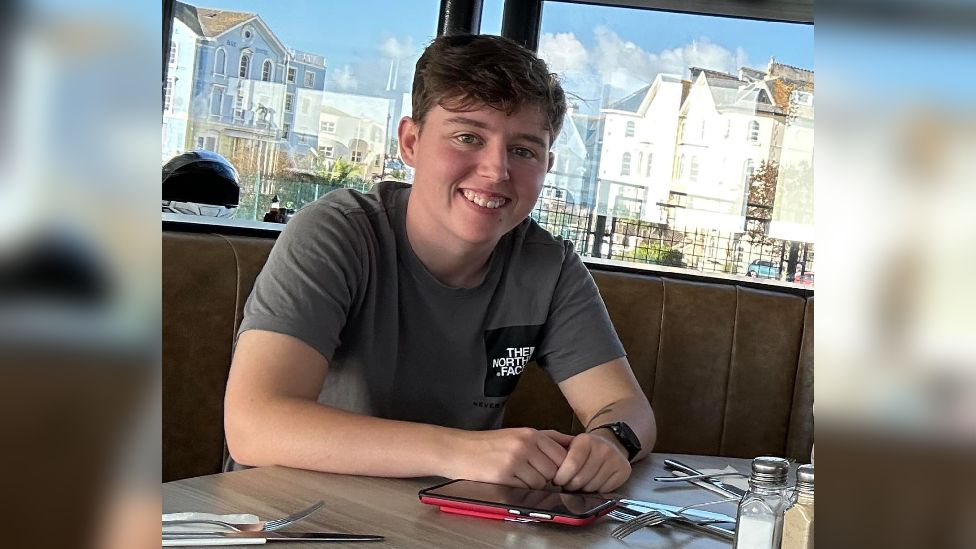
Sean can now access the adult Welsh gender service, but there is no equivalent for children
Children with gender dysphoria are being “let down” by a lack of access to help in Wales, campaigners have said.
Anyone looking to speak to a doctor or professional about changing their gender has to go to London.
Sean Donovan was 14 when he knew he had gender dysphoria and said it was a “cop out” that Wales did not have a service for young people.
The Welsh government said it was committed to improving gender identity support for young people.
A report by the children’s commissioner for Wales said NHS England’s interim service – which is also the only option for children from Wales – was “highly concerning” and contrary to their human rights.
It also said it was at odds with the Welsh government’s LGBTQ+ action plan.
The gender identity service offered in Wales goes through London’s Tavistock clinic.
Image source, Sarah Donovan
Sean (pictured here as a child with his mum Sarah) says he was aware of his gender when he was younger but did not have the words or knowledge to explain it
Sean, 19, from Caerphilly, said he and his family had to access treatment privately because of the long wait on the NHS.
“If I didn’t do anything I knew I wouldn’t be able to stay well mentally,” he said.
“I wasn’t thinking about my future – there was no future.”
He said young people were being “let down” because they have to go to London for treatment they could get closer to home.
Image source, Sarah Donovan
Sarah said young people such as her son Sean were being failed by having to wait for a service in England
Sarah Donovan said “her world crashed” when her son told her he identified as transgender, adding that a children’s gender service was needed in Wales.
“Children and young people are waiting in limbo, there is nothing for them,” she said.
She said more services were “needed for you, closer to where you live” but has not made recommendations on the use of hormone treatments.
Rachel Thomas, head of policy and public affairs for the children’s commissioner for Wales, said using England’s services “doesn’t necessarily give the opportunity to fulfil all the aims and goals for how Wales wants to approach this issue as a nation”.
This, coupled with increasingly long waiting lists, was “one of the strong reasons for looking at a Wales-specific gender service,” she added.
“We’re talking years, not months, on waiting lists. You can’t just carry on as you are and hope for the best, waiting until you get that first appointment.”
Christina Witney, from Cardiff, said her 13-year-old son, whose name she did not want to give, was stressed most of the time and cried himself to sleep as he waited to see a doctor about his gender dysphoria.
She took him to the GP when he was 10 but does not think that people “understand the severity of the issue” and more help was needed for children questioning their gender identity.
“Having treatment would dramatically improve his health and how he feels… his body is changing and it is really distressing – it outs him to other people.”
Image source, Sarah Donovan
Sean said access to services did not necessarily mean hormones, surgery or puberty blockers, but therapy, counselling and support
Ms Thomas said gender services was one of the few areas of healthcare where services were better for adults, whereas usually you would expect to see “services fall away as you move into adult services”.
She said a Wales gender service would be a place for support, not necessarily treatment: “It could be just counselling, it doesn’t mean hormones or puberty blockers.”
On the review being led by Dr Cass, Ms Thomas said the children’s commissioner had contact from people who were concerned about the direction it was going in.
“We are watching closely to see what does come out, particularly with the Welsh government pinning their approach so strongly to that.”
The review of transgender services in England is being led by Dr Hilary Cass
The Welsh Health Specialised Services Committee for NHS Wales said there were no immediate plans to develop a children and young people’s gender service independent to NHS England’s.
This will be aligned to Dr Cass’s final report, which is expected to be published soon.
NHS England said the Gender Identity Development Service at the Tavistock Centre would close on 31 March and any patients wanting to continue their care would be “transferred to a suitable alternative NHS provider on 1 April 2024 where they will receive the specialist support they need”.
A spokesman added: “The NHS has outlined plans to establish around eight regional services and we are engaged with a number of NHS children’s hospitals to roll these out over the next few years.”








